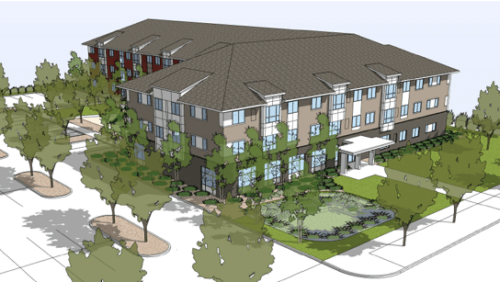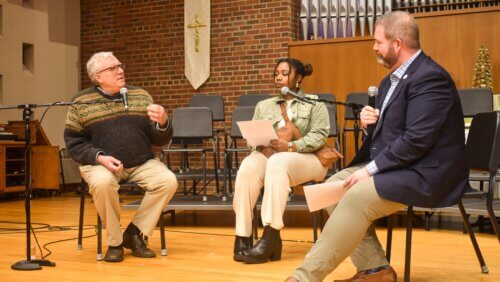Go Big, Go Bold: Beacon’s Policy Agenda
Beacon’s approach has never been a timid one. We take personal, public, and financial risks in the fight for justice. We go big. We go bold.
Lee Blons, CEO/President of Beacon Interfaith Housing Collaborative
We are able to do things that no other housing organization could do because of the engagement and advocacy of your congregation. We are able to do things that no single congregation could do because we have united as a collaborative. It is really remarkable the impact that our collaborative of congregations is having. We believe that we can have an even greater impact by growing our capacity and power to influence public policy and funding toward our vision that all people have a home.
Beacon’s approach has never been a timid one. We take personal, public, and financial risks in the fight for justice. We go big. We go bold.
And tonight, I want to share with you three big, bold policy agenda items that Beacon seeks to advance. We will be asking Commissioner Ho tonight for her support on these issues. We will be inviting Governor Walz to meet with us again in January to declare his support as well. I ask for your help as leaders in engaging your congregations and the broader community in taking action on these items.
But first, I want to step back and talk about our values and vision as a collaborative that informs this policy platform.
As a collaborative of congregations, we are working toward the vision all people have a home: no exceptions. Our challenge is to transform the prevailing worldview – that there isn’t enough, that not everyone can have a home, that some people are more deserving, that it’s acceptable for some of us to be homeless. We need to spread the worldview that there is enough, that it is not okay for anyone to be homeless, that we all benefit when we all have a home. One way we do that is through a policy agenda that lifts up our values and allows us to engage our fellow congregants and our broader community in a discussion about home.
Consider how attitudes about hunger have changed. Fifty years ago, hunger was not necessarily something that was in the public arena. But today it is a pretty solidly-shared belief that no child should go to bed hungry – we have the resources to create programs like food stamps to ensure there is food to eat. Can we move toward that same belief around home – that no child should go to bed homeless? That every child is worthy of a home with a pantry or a cupboard, a refrigerator where this food can be stored? Is worthy of a safe, warm place where they can eat their mac and cheese or broccoli or scrambled eggs at a table while their little sister does her homework? Is it so bold to declare this is the Minnesota we want to live in?
Our policy agenda is grounded in this vision. We currently have three policy issues: one is the Housing Infrastructure Bonds that will be voted on in the next legislative session; the second is a change in resources to make it possible to create family supportive housing, which we hope to pass in 2020 or 2021; and lastly a bold transformative policy to create a state rent subsidy program that frankly may take years to enact.
First, we need capital funding to be able to create the homes that you have heard our leaders discuss – Bimosedaa, Vista 44, and our new housing in the works in Scott County, Minneapolis and St Paul – and it’s needed across the state to create more affordable homes in every community.
Minnesota has been a pioneer in the development of Housing Infrastructure Bonds. Bonding has been used traditionally for bridges and roads and improvements at state institutions like the University of Minnesota or the Science Museum. It took a change in worldview but now, it is widely accepted that housing infrastructure is as important as our transportation system. Housing Infrastructure Bonds were the primary source of funding for 66 West and Prior Crossing. Our goal in 2020 – $180 million from the legislature – would be the largest amount ever!
Second, Beacon is taking the lead to change a disability program, called Housing Support, to make it work for homeless families.
In our planning over the last two years around family supportive housing, we have uncovered specific barriers to the development of supportive housing for families. Housing Support, the disability funding program that provides rent and service funding at Great River Landing and Bimosedaa, works well for individual adults. But not for families.
We are now asking the Department of Human Services, the Governor and the Legislature to tweak Housing Support so that parents and their children can benefit from this program. We are calling this “right-sizing” the program for families. The current subsidy provides $922 for rent and household goods, which works for a single adult but it isn’t enough for a 2, 3 or 4 bedroom apartment. We are excited to discuss this with Commissioner Ho tonight. We know she understands supportive housing and has the power to influence her colleagues at the Department of Human Services.
I have shared how we hope to grow capital investment and support for family supportive housing.
Now I want to share our third really big, bold proposal. It’s time to create a solution that matches the magnitude of the housing problem.
100,000 households (not people, but households) are paying more than half of their income for rent each month. That is, they’re paying it until one thing goes wrong – a car break down, an illness, a divorce – and they end up homeless. You’ve likely heard about the eviction crisis. Almost all evictions are due to non-payment of rent, not behavior.
But the good news is that these 100,000 households already have homes! They just struggle to pay rent each month and meet all of the other needs of their family. How do we go upstream to stabilize families so they never become homeless?
The simple solution is rent subsidy. Making up the difference between what a family can afford (30 percent of their income) and what the housing actually costs. Right now, a mother earning $2,000 a month might be paying $1200 in rent each month – this leaves her only $800 a month for food, childcare, transportation, healthcare and all the other things she and her children need. With a subsidy that would reduce her rent to 30 percent of her income, she would have an additional $600 a month to take care of her children. She might even be able to save a little.
You might be thinking, though: don’t we already have a rent subsidy program in America? Yes. Federal rent subsidy and public housing. But it has an artificial cap placed on it. Unlike food stamps, just because you qualify for it, doesn’t mean you get it. Only one out of four families that qualify actually get help.
Our proposal is to make Minnesota the first place where rent subsidy, like food stamps, is provided to everyone who qualifies.
Our proposal is to begin the discussion on the principle. Do we agree that we all benefit when we all have homes? Do we agree that if you income qualify for a subsidy, you should get one? If that is what we believe, we are called to act on our values and together figure out where the resources will come from to pay for it.
We know it will be expensive. But it is also expensive to have neighbors who are homeless or perpetually on the verge of homelessness. And it’s a critical step toward racial justice. Homelessness and housing instability impacts people of color disproportionately.
It impacts all areas of our community: education, health care, transportation, criminal justice. So I believe that we can build a multi-sector campaign of teachers, hospitals, unions, and employers that unites behind this bold solution. A rent subsidy is a win-win for landlords and tenants. It’s a win for Minnesota.
That being said, it requires the transformation of a world view: do we believe that we all benefit when we all have a home? Beacon is uniquely positioned to change hearts and minds and the prevailing worldview. As people of faith, we act on our values. In our pulpits, through our lay leaders and community networks, we can launch the community dialogue on how we truly end homelessness. We can assure each other that there is enough. We can proclaim that it is not okay for anyone to be homeless. We can demonstrate that we all benefit when we all have a home
This won’t be won overnight, which means we need to start NOW.
Now is the time to lay out a vision, build support within our congregations through education and dialogue, and ask our public officials to become champions in this cause. We go big, because we know these policies are winnable when we act together. We go bold, because the scope of our vision and the child yearning for a table of her own to do her homework ask nothing less from us. Please join me in bringing our shared values and vision into the public arena to fulfill our vision that all people have a home.


